L.H. Stallings - Funk the Erotic: Transaesthetics and Black Sexual Cultures
Here you can read online L.H. Stallings - Funk the Erotic: Transaesthetics and Black Sexual Cultures full text of the book (entire story) in english for free. Download pdf and epub, get meaning, cover and reviews about this ebook. year: 2015, publisher: University of Illinois Press, genre: Romance novel. Description of the work, (preface) as well as reviews are available. Best literature library LitArk.com created for fans of good reading and offers a wide selection of genres:
Romance novel
Science fiction
Adventure
Detective
Science
History
Home and family
Prose
Art
Politics
Computer
Non-fiction
Religion
Business
Children
Humor
Choose a favorite category and find really read worthwhile books. Enjoy immersion in the world of imagination, feel the emotions of the characters or learn something new for yourself, make an fascinating discovery.
- Book:Funk the Erotic: Transaesthetics and Black Sexual Cultures
- Author:
- Publisher:University of Illinois Press
- Genre:
- Year:2015
- Rating:3 / 5
- Favourites:Add to favourites
- Your mark:
Funk the Erotic: Transaesthetics and Black Sexual Cultures: summary, description and annotation
We offer to read an annotation, description, summary or preface (depends on what the author of the book "Funk the Erotic: Transaesthetics and Black Sexual Cultures" wrote himself). If you haven't found the necessary information about the book — write in the comments, we will try to find it.
Stallings uses funk to highlight the importance of the erotic and eroticism in Black cultural and political movements, debunking the truth of sex and its histories. Brandishing funk as a theoretical tool, Stallings argues that Western theories of the erotic fail as universally applicable terms or philosophies, and thus lack utility in discussions of black bodies, subjects, and culture. In considering the Victorian concept of freak in black funk, Stallings proposes that black artists across all media have fashioned a tradition that embraces the superfreak, sexual guerrilla, sexual magic, mamas porn, black trans narratives, and sex work in a post-human subject position. Their goal: to ensure survival and evolution in a world that exploits black bodies in capitalist endeavors, imperialism, and colonization.
Revitalizing and wide-ranging, Funk the Erotic offers a needed examination of black sexual cultures, a discursive evolution of black ideas about eroticism, a critique of work society, a reexamination of love, and an articulation of the body in black movements.
|CoverTitleContentsPrefaceAcknowledgmentsIntroductionPart I. Freaks, Sacred Subjectivity, and Public Spheres1.Sexual Magic and Funky Black Freaks in Nineteenth-Century Black Literature2.In Search of Our Mamas Porn: Genealogies of Black Womens Sexual Guerrilla Tactics3.Make Ya Holler Youve Had Enough: Neutralizing Masculine Privilege with BDSM and Sex Work4.Marvelous Stank Matter: The End of Monogamy, the Marriage Crisis, and Ethical SluttingPart II. Superfreaks and Sites of Memory5.Sexuality as a Site of Memory and the Metaphysical Dilemma of Being a Colored Girl6.From the Freaks of Freaknik to the Freaks of Magic City: Black Women, Androgyny, Dance, and Prof7.Black Trans Narratives, Sex Work, and the Illusive FleshConclusion: Funk StudiesThe B-SideNotesBibliographyIndex|
Emily Toth Award for Best Single Work by One or More Authors in Womens Studies, Popular Culture Association/American Culture Association (PCA/ACA), 2016
Finalist, 28th Annual Lambda Literary Awards, LGBT Studies, 2016
Alan Bray Memorial Book Award, GL/Q Caucus of the Modern Language Association, 2016 Popular Culture Association/American Culture Association (PCA/ACA)
Emily Toth Award for Best Single Work by One or More Authors in Womens Studies, Popular Culture Association/American Culture Association (PCA/ACA), 2016
Finalist, 28th Annual Lambda Literary Awards, LGBT Studies, 2016
Alan Bray Memorial Book Award, GL/Q Caucus of the Modern Language Association, 2016
LGBT Studies
Emily Toth Award for Best Single Work by One or More Authors in Womens Studies, Popular Culture Association/American Culture Association (PCA/ACA), 2016
Finalist, 28th Annual Lambda Literary Awards, LGBT Studies, 2016
Alan Bray Memorial Book Award, GL/Q Caucus of the Modern Language Association, 2016 GL/Q Caucus of the Modern Language Association
|
L.H. Stallings is Associate Professor of Womens Studies at the University of Maryland-College Park.
L.H. Stallings: author's other books
Who wrote Funk the Erotic: Transaesthetics and Black Sexual Cultures? Find out the surname, the name of the author of the book and a list of all author's works by series.

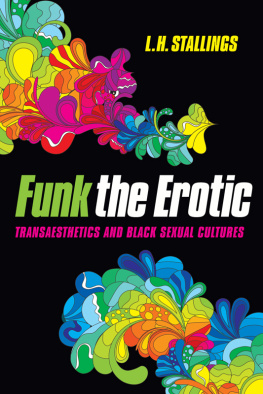



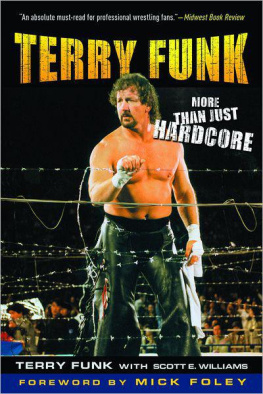
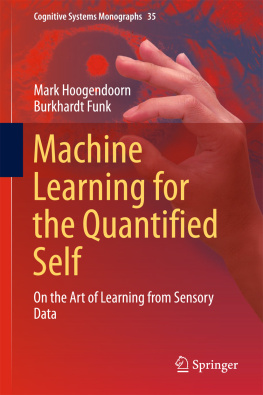
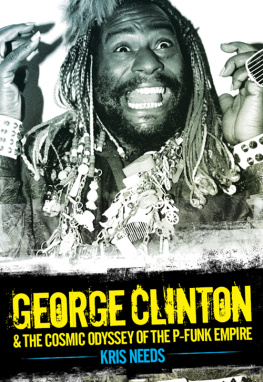
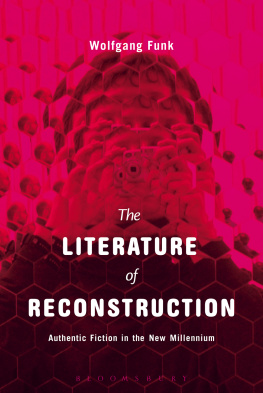
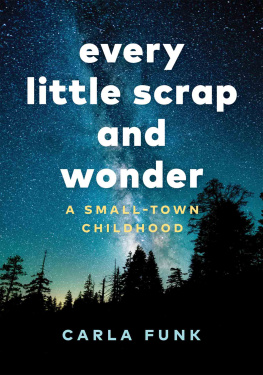
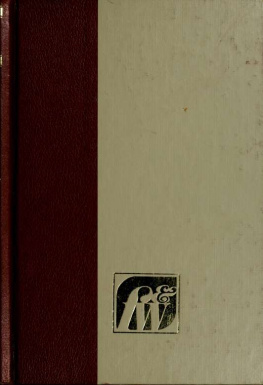

 This book is printed on acid-free paper.
This book is printed on acid-free paper.